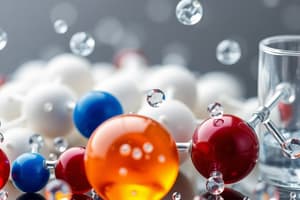Podcast
Questions and Answers
What is chemistry primarily concerned with?
What is chemistry primarily concerned with?
- How matter behaves and what can happen when different types combine (correct)
- Exploring the properties of light and sound
- Investigating the behavior of living organisms
- Understanding the laws of motion
How do elements differ from compounds?
How do elements differ from compounds?
- Elements have fixed proportions while compounds do not
- Elements include multiple types of atoms, compounds do not
- Elements are gaseous, compounds are solid or liquid
- Elements can be broken down into simpler substances, compounds cannot (correct)
In which state of matter do particles move rapidly without being able to stick together permanently?
In which state of matter do particles move rapidly without being able to stick together permanently?
- Plasma
- Solid
- Liquid
- Gas (correct)
What do the symbols in chemical equations represent?
What do the symbols in chemical equations represent?
What is a compound made up of?
What is a compound made up of?
Which state of matter has weak forces holding its particles together?
Which state of matter has weak forces holding its particles together?
Flashcards are hidden until you start studying
Study Notes
Science: An Overview of Chemistry
Chemistry is one branch of science that deals with matter—what it's made of, how it behaves, and what can happen when different types combine. At its core, chemistry involves studying atoms and molecules and understanding their properties, behavior, and interactions with each other through chemical reactions. Several key concepts define this field:
Elements and Compounds
Elements are basic units of all matter; they cannot be broken down by ordinary means into simpler substance. In contrast, compounds consist of two or more elements bonded together in fixed proportions. For example, water is composed of hydrogen and oxygen, which chemically bind together to form H2O.
Matter States
Matter exists in three states: solid, liquid, and gas. Each state has unique physical characteristics that determine their properties, such as density, volume, temperature sensitivity, etc.. While solids maintain their shape due to weak forces holding them together, liquids have strong bonds causing them to flow easily. Gases expand freely because particles move rapidly without being able to stick together permanently.
Equations
Scientists explain individual chemical reactions using equations containing letters representing specific chemicals involved. These symbols represent either pure elements like sodium (Na) or combinations of elements known as compounds (e.g., water = H2O). When you perform experiments based on these equations, you learn about the relationships between reactants and products during various processes within our universe.
In summary, chemistry explores the properties and behaviors of different materials by examining their atomic compositions and molecular structures. By doing so, researchers gain insights into how objects interact and change under different conditions. This knowledge helps us understand everything from everyday experiences to complex phenomena occurring throughout nature.
Studying That Suits You
Use AI to generate personalized quizzes and flashcards to suit your learning preferences.




